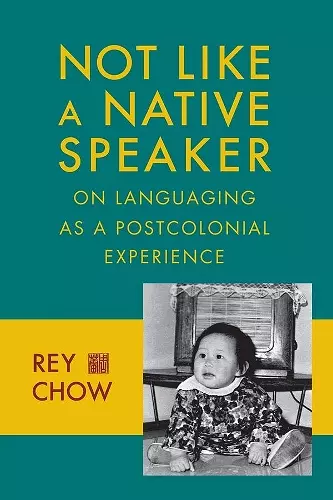Not Like a Native Speaker
On Languaging as a Postcolonial Experience
Format:Hardback
Publisher:Columbia University Press
Published:17th Oct '14
Currently unavailable, and unfortunately no date known when it will be back

Rey Chow's Not Like a Native Speaker examines the biopolitics of language in postcolonial contexts, revealing the complexities of identity and power through diverse narratives.
In Not Like a Native Speaker, Rey Chow explores the intricate dynamics of language and identity in a postcolonial context. The book delves into the complexities of biopolitics as they relate to speaking and writing, highlighting the enduring effects of colonial encounters on contemporary linguistic practices. Through a diverse cast of characters, Chow illustrates how language serves as both a tool of empowerment and a site of struggle, revealing the nuanced relationships between race, class, and language in a world still grappling with the legacies of colonialism.
The author presents a series of compelling vignettes featuring individuals from various backgrounds, such as a young mulatto discovering a photograph that challenges his understanding of skin color, and Indian call center agents adapting their accents to fit American norms. These narratives not only showcase the personal experiences of the characters but also reflect broader societal issues related to linguistic inequality. By weaving together these stories, Not Like a Native Speaker emphasizes the importance of recognizing the historical contexts that shape our understanding of language and identity.
Chow's work is a significant contribution to postcolonial studies, as it expands the discourse surrounding language use and its implications for identity formation. By examining the geopolitical boundaries of postcolonial inquiry, she invites readers to reconsider the role of the native speaker and the complexities inherent in cross-cultural communication. Ultimately, Not Like a Native Speaker challenges us to engage with the intricacies of language in a way that acknowledges both its power and its limitations.
A critically important and intellectually exciting contribution to debates concerning voice and language in postcolonial studies. -- Zahid R. Chaudhary, Princeton University May become one of the classic texts of Anglophone postcolonial studies. -- Panivong Norindr, University of Southern California Not Like a Native Speaker reads like a great novel. Through a dazzling array of historical and contemporary scenes, Rey Chow makes yet another invaluable contribution to postcolonial and diaspora studies, this time by taking on the vexing, yet hugely important, issue of "languaging," the racialization of bodies via the loss of native languages or accented speech. She examines the losses and affects that befall subjects who find themselves in the interstices of unequal languages and political economies with the same unflinching honesty and intellectual rigor that her scholarship has accustomed us to. -- Smaro Kamboureli, Avie Bennett Chair in Canadian Literature, University of Toronto Rey Chow's book Not Like a Native Speaker is not only a brilliant and original reflection on the fate of language in the afterlife of colonialism, but also an authoritative statement on postcolonial theory; moving beyond the confinement of the politics of identity, it provides a unique map for the postcolonial criticism of the future, one informed by rigor and unafraid of judgment. -- Simon Gikandi, Princeton University How does colonial power deploy language?-a central question in postcolonial studies-is infused with new life by Rey Chow in this dazzling book. Chow poses other searching questions concerning identity and estrangement, memory and oblivion, bilingualism and aphasia, and offers acute discussions of language in Fanon, Benjamin, Derrida, Achebe, and Ngugi. Not Like a Native Speaker is provocative and indispensable. -- Roland Greene, Stanford University [Not Life a Native Speaker] offers new, thought-provoking insights into the social effects engendered by imperialism and the rapid development of new communication technologies. -- Andrea Riemenschnitter Modern Chinese Literature and Culture
ISBN: 9780231151443
Dimensions: unknown
Weight: unknown
192 pages